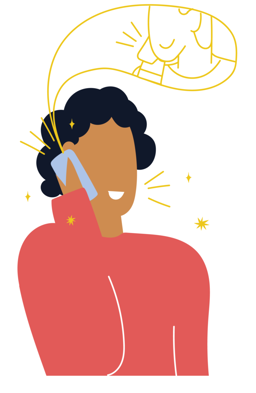
Moving away from home and starting university is a significant life changing event for anyone. On top of this, we’re dealing with a global pandemic. You’ll be better placed to make the most of your uni experience and flourish in the face of adversity if you take some time to invest in your wellbeing.
Wellbeing: “a state of complete physical, mental, and social wellbeing, and not merely the absence of disease or infirmity.”
Steps to achieve wellbeing at uni:
Connect with People
- Socialising has to be done differently now and it’s essential that we each play our part in preventing the spread of the virus through physical distancing. Fresher’s week won’t be quite the same but it won’t necessarily be the worse for lacking close physical contact with hordes of (mostly) intoxicated, sweaty strangers in jam-packed venues.

- Take advantage of what’s on offer – there will be plenty of ‘socially distanced’ opportunities to get to know new people, find like-minded souls and form meaningful new friendships.
- Use technology to connect with others: join on-line forums, Zoom events, etc. but bear in mind that too much social media can have a negative impact on our mental health and leave us feeling even more isolated.
- Meet up with others outdoors – explore the city and the countryside beyond.
- Keep in touch with family and friends from back home – try writing a letter or sending a postcard – a lovely gesture when so much contact has moved online.
- Decorate you room with reminders of the people, places, pets etc. that you care about.
- Listen to a chatty radio station or podcast if it feels too quiet.
- It can sometimes seem like everyone else is living their best life and having all the fun with their fabulous friends. This isn’t the reality for most people. Don’t compare yourself to others. It’s normal to feel lonely sometimes. Friendships don’t happen overnight.
- Don’t be alone. If you’re struggling to connect with your new peer group and feel like you have no one to talk to, reach out to services who will help. Speak to Jan, Unipol’s Wellbeing Coordinator, for support with this.
Eat regularly and stay hydrated
Moving away from home may mean that you’re responsible for all your own meals for the first time. Take some time to learn what’s good for you and what’s not.
If you have a difficult relationship with food and eating, make sure you know where to go to get help and support with this.
Eating regular meals and a maintaining a balanced diet doesn’t just affect our physical health; the right approach to food can improve our mood, increase our energy levels and help us to think more clearly.
- Eat regularly – If your blood sugar drops you might feel tired, irritable and depressed. Eating regularly and choosing foods that release energy slowly will help to keep your sugar levels steady. This includes pasta, rice, oats, wholegrain bread and cereals, nuts and seeds.
- Eat vegetables and fruit – they contain a lot of the minerals, vitamins and fibre we need to keep us physically and mentally healthy.

- Eat protein – it contains amino acids, which make up the chemicals your brain needs to regulate your thoughts and feelings. It also helps keep you feeling fuller for longer. Examples include lean meat, fish, eggs, cheese, legumes (peas, beans and lentils), soya products, nuts and seeds.
- Eat the right fats – Your brain needs fatty acids (such as omega-3 and -6) to keep it working well. So rather than avoiding all fats, it’s important to eat the right ones. Healthy fats are found in: oily fish, poultry, nuts (especially walnuts and almonds), olive and sunflower oils, seeds (such as sunflower and pumpkin), avocados, milk, yoghurt, cheese and eggs. Try to avoid anything which lists ‘trans fats’ or ‘partially hydrogenated oils’ in the list of ingredients (such as some shop-bought cakes and biscuits). They can be tempting when you’re feeling low, but this kind of fat isn’t good for your mood or your physical health in the long run.
- Look after your gut – Sometimes your gut can reflect how you are feeling emotionally. If you’re stressed or anxious this can make your gut slow down or speed up. For healthy digestion you need to have plenty of fibre, fluid and exercise regularly. Healthy gut foods include: fruits, vegetables and wholegrains, beans, pulses, live yoghurt and other probiotics.
- Manage caffeine – it’s a stimulant, so it will give you a quick burst of energy, but then may make you feel anxious and depressed, disturb your sleep, or give you withdrawal symptoms if you stop suddenly. Caffeine is in tea, coffee, chocolate, cola and other manufactured energy drinks.
- Stay hydrated – If you don’t drink enough fluid, you may find it difficult to concentrate or think clearly. You might also start to feel constipated (which puts no one in a good mood). Try to drink between 6–8 glasses of fluid a day.
Cooking and eating together can be a fun way to bond with new housemates. But be aware; – tensions and unpleasantness can flare up if kitchens are left in a mess, or housemates take food / use pots and pans without permission. Be sure to discuss attitudes to food and standards of cleanliness with the entire group. Some housemates may have specific needs through choice or for medical / religious reasons, and this must be respected. Establish some ground rules early on so cooking and eating can be an enjoyable, nourishing and nurturing part of each day.
Stay Active
Build physical activity into your daily routine, both indoors and outdoors.
Get as much sunlight, fresh air and nature as you possibly can.

Get outdoors. Walk, run, cycle, explore your new environment and beyond!
- Check out urban walks in Leeds and Bradford, experience the dramatic scenery of West Yorkshire and explore the railways and canals of its industrial past: http://casualramblers.co.uk/wyorks/
- Where to walk in Nottingham:https://www.nottinghamshire.gov.uk/planning-and-environment/walking-cycling-and-rights-of-way/walking
Or bring the outdoors in. Open the window or position yourself so you can see views of nature or the sky. Get some house plants or grow your own seeds. Display photos of nature or create arts / craft with natural objects.
Take care with news and information
Keep up-to-date but use trusted sources and be aware that fake stories, conspiracy theories and misinformation abounds.
Manage your mental health
There’s certainly lots to look forwards to and feel excited about coming to University, but we face uncertain and challenging times. You’re bound to have some mixed feelings and difficult emotions to deal with along the way. You might feel anxious, stressed, confused, scared, angry, sad, overwhelmed or unsure of yourself and the word around you. It’s normal to have negative feelings during times of change or difficulty and you certainly won’t be the only one.
Talking to people you trust can help. Contact your friends and family. Reach out to services that offer specialist support. If you feel overwhelmed, talk to a health worker or counsellor. Have a plan, where to go to and how to get help.
Smoking, drinking alcohol or using drugs might provide some immediate relief but using substances can bring their own problems and they aren’t a helpful way to deal with your feelings. Try to find effective ways to relax and de-stress. Draw on techniques that have been successful in the past and experiment with new ways to manage your emotions and deal with life’s adversities.
Do things you enjoy

Balance your academic studies with other activities that make you feel good. Get creative, artsy or crafty. Exercise or play sport. Read or write (for pleasure). Listen to, dance to or make some music. Play games or solve puzzles. Whatever it might be, do the things that lift your mood. Relaxation techniques such as mindfulness or meditation can help you to de-stress. The more you practice, the better able you will be to relax.

